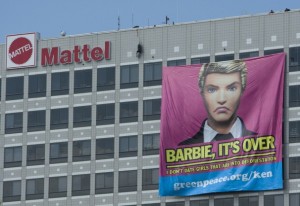Activists Find Their Mojo
Three new Greenpeace campaigns suggest the major activist organizations are once again targeting global brands to drive awareness about issue campaigns.
In June, Greenpeace held a demonstration against Mattel that included hanging a giant banner on the side of the company’s headquarters. The stunt, which got international media coverage, was part of the group’s campaign against the toy industry, alleging the industry buys packaging from a company responsible for deforestation in Indonesia. The campaign also targets Hasbro, Lego, and Disney.
In Europe, the group launched a campaign against VW claiming the company opposes legislation that would raise auto emissions standards by 2020. The campaign video, a parody of VW’s 2011 Star Wars Super Bowl ad, features the Death Star emblazoned with the VW logo, and a demonstration in London featured street-canvassing stormtroopers.

Screen-grab from Greenpeace's VW campaign video.
On July 12, Greenpeace launched a campaign alleging Nike and Adidas permit their suppliers in China to discharge hazardous chemicals into the Yangtze and Pearl river deltas. The campaign includes a viral video, challenging the companies to ensure their supply chains don’t contribute to water pollution.
Since the start of the recession, these types of campaigns have been rare. Most activist groups have focused on local issues: protesting the siting of a new factory, attacks on local power utilities, a demonstration against a proposed dam, and the like. When donations slow, activist groups retrench just like everyone else, and when voters are primarily focused on the economy, it’s easier to get their attention with issues that are local and tangible.
Likewise, most companies in recent years have dedicated their public affairs resources to legislative and regulatory affairs rather than activist issues. But, these new campaigns suggest it’s again time for issues managers to consider how activists might target company brands. Those who don’t might suddenly find someone using their brand to explain to people why they should quit buying the company’s products.


No comments